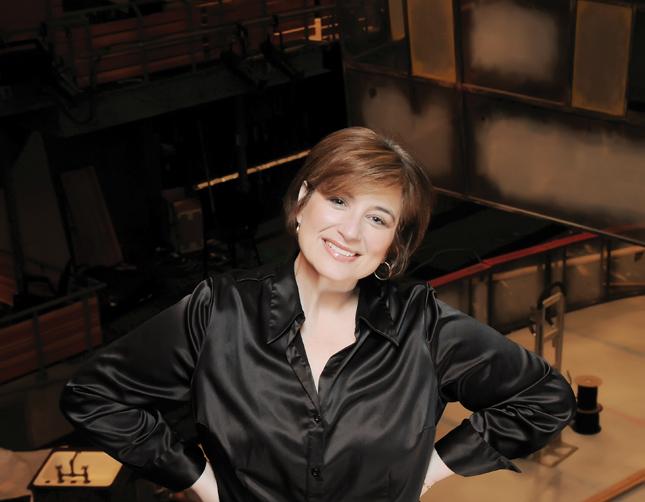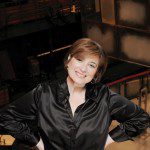The Player: Linda Levy Grossman
By • July 26, 2011 0 2776

Linda Levy Grossman is reviewing photos for this article with WTOP’s Bob Madigan and me at RIS restaurant. Grossman, the Helen Hayes Awards president and CEO explains one of them.
“We wanted the recipients of the awards to have something that would distinguish them,” she says. “One of the staging assistants brought out Victoria’s Secret bags and I said, ‘I’m going to tell you right now, on behalf of the Helen Hayes awards for all you recipients: you’re all going to get lei’d.’”
Winners received, “lovely 68 cent leis from Oriental Traders – no expense was spared,” she says, as we laugh. “The Victoria’s Secret bag cost more.”
The night when the organization bestows awards on the finest actors in DC – this city’s answer to the Tony’s – is one of Grossman’s most inspiring and challenging ventures. “Immediately after the presentation the curtain comes down and I’m wandering around and hearing people say, ‘Gosh. I wish I had seen that,’” she recalls. “And I ask myself how can we lasso that energy and get them to the theater?”
The evening brings out the verve and creativity with which Grossman pilots the organization at the helm of the region’s performing arts. But it also demonstrates her demanding mission. While she sees more than 100 shows each year, she strives to ensure others also invest their money and time.
The Evolution of Helen Hayes
For the last year and a half, she has been working with consultants on a Compass foundation grant to identify the 27-year-old organization’s true potential. A major focus: to translate her oft-quoted challenge of putting “butts in seats” into a loftier goal of branding. The CEO of two years wants to define Washington theater like Broadway or the West End.
“Before you go to London or New York you think: What am I going to see when I get there,” she says. “Imagine visitors coming here to go to the theater.”
The evolution will encompass changing the communications, strategy, governance, programming, staffing, funding and name of the organization (although the award’s will remain unchanged). It will build on the core functions that have helped expand Washington’s 20 niche theaters to today’s vibrant 79 since she joined Helen Hayes.
Grossman has spent more than two decades supporting the group, including 13 years on the leadership team. Yet she is modest about her accomplishments, unlike her friend and sometime co-worker, Olney Theatre Centre Producing Director Brad Watkins.
“The Helen Hayes Awards have really created the engine for the expansion and growth of the theater industry in Washington DC,” Watkins said in a phone call. “It is that sort of a central linchpin that has given such focus to the arts that allowed companies of varying size to flourish.”
In its new guise, the organization will continue to promote a culture of theatrical excellence and provide a stamp of achievement to those who shine. The $1 million organization will expand their advocacy for the arts, cultivating new audiences and building on an education program that has already introduced 40,000 children in District public schools and Boys & Girls Clubs to the magic of the theater. That project has special resonance with Grossman.
“I respond to that program so personally and am so enthusiastic about it because I was one of those children whose life was literally turned around by a teacher,” she says.
Childhood Dreams
The Baltimore resident aspired to become a pediatrician in the 11th grade, approaching it with trademark, if misdirected, enthusiasm.
“I was the poster child for future doctors of America,” she announces. “I volunteered in hospitals, I was a candy striper, I audited classes in medical school, I saw surgeries.” Yet despite flagging interest and dropping math and chemistry grades, she didn’t know how to alter her ambition. That changed when one class she enrolled in was filled and she was reassigned to a speech class.
“That was a pivotal moment in my entire life,” Grossman says. Ms. Ann-Michelle Bennett, the speech and drama teacher, saw potential in the shy and awkward teenager. She assigned Grossman to stage manage all the year’s productions. The newly directed and confident Grossman followed her idol to Emerson College, graduating with a degree in theater.
She came to DC after graduating, joining Harlequin Dinner Theatre a few years later. She worked long hours as she promoted the local touring company, living in a Germantown condominium development on a cul-de-sac with three coworkers.
“Linda was a culinary genius,” Watkins recalls. “Every now and then she would make wonderful, incredibly complex dinners that were far beyond what our unsophisticated palates could appreciate. We thought we were Knot’s Landing.”
The Harlequin led to other jobs, and she eventually ended up freelancing at the Helen Hayes. Over the years, Grossman has done virtually every backstage task—building sets, running light boards, stage managing, hanging lights and sewing costumes—as well as all deskwork, from communication to development.
Not surprisingly, Grossman exposed her son Benjamin to the theater at an early age. But her aspirations for him revolved around her desire for devoted care and the continued status as the most important woman in his life.
“I wanted him to be a gay dentist,” she quips. “He assures me he’s going to be neither, to which I say take a knife and stick it in my heart and turn it.”
Four years ago, after stage managing Shakespeare productions at Imagination Stage, Benjamin applied to the Baltimore School for the Arts, making his ambitions clear.
“I thought he would be an audience member,” she says. But Benjamin corrected her misconceptions.
“You’ve been taking me to the theater since I was two,” he told her. “You honestly think it wouldn’t have taken?”
True Appeal and Potential
To make it ‘take’ for others, she has to win time from popular and often heavily marketed pursuits like Facebook, television and movies. As she puts it, a theater ticket is “a purchase that is perceived to be risky, that is perceived to be expensive, that’s perceived to be something that ‘if I don’t like it, it’s two hours I am never going to get back.’”
However, she is working to combat this stigma. “There are phenomenal ticketing opportunities. It’s incredibly accessible. It’s two hours – take a risk. It’s not electronic. It’s alive, it’s real and it’s true.”
For some people, plays already hold huge appeal. Surveys show that theater and art attendance tends to be shaped like an hourglass: more shows in the later teens and 20s, a drop as people raise families, and a resurgence as they come back in their 50s and 60s. The graying of the audience is a helpful trend for theater.
But young audiences are a challenge, as education programs demonstrate. “When we talk to kids, we say, ‘Who has been in a theater?’ All the hands go up. Great. Tell me what you saw…and they refer to various movies.
“Then we ask, ‘Who’s seen live theater with real people on a stage acting out a story, a play, a musical?’… Not one.” But programs that go behind the scenes generate long-term enthusiasm from these first-time audiences.
Grossman would rather “under-promise and over-deliver” on the new organization. Yet she dreams about its potential impact.
“It could double the number of people who are currently in Washington theaters from 2 million to 4 million,” she says. “It could provide health insurance for actors and artists. It could more efficiently connect the about 130 education programs that are offered by area theaters with kids in area schools through the region who desperately need them.”
She pauses as she searches for a sufficiently dramatic word. “It could be dazzling.”
Click here to listen to the interview with Linda Levy-Grossman
February 23rd Interview with The Player Linda Levy-Grossman by Bob Bob Madigan, WTOP Radios Man About Town 103.5 FM
- Linda Levy Grossman, Helen Hayes Awards president and CEO | Photos courtesy of Shannon Finney



